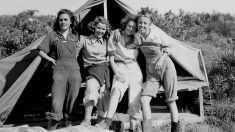When rural voters woke up May 3, 2011, those who had not stayed up late the night before found out their overwhelming choice for government had triumphed.
After two minority governments, Conservative Stephen Harper had won a majority that would last at least 53 months before the next election in 2015.
On the Prairies, the victory was particularly sweet.
Since 1993, many conservative westerners had worked hard to support the Reform party and its successor parties with their promise to reduce the influence of the Liberal party, the federal government and Quebec on national political debates.
Read Also

U.S. grains: soybeans firm ahead of USDA data
Chicago soybeans ticked up slightly on Wednesday as traders adjusted positions ahead of the release of official U.S. data on global supply and demand on Friday, the first update in weeks, but prices were capped by a lack of large Chinese purchases.
On May 2, 2011, often with majorities topping 70 percent, Conservatives won 51 of 56 seats on the Prairies.
So despite the much-touted Conservative breakthrough in urban Ontario, rural Canada and the West really sealed the deal for the Conservative majority.
A year later, what do those voters have to show for it?
Quite a lot, actually.
In its first year of more-or-less unfettered power (subject to court challenges), the Conservative government has:
• ended the CWB marketing monopoly, effective Aug. 1, 2012. Although single desk defenders continue to fight in court to restore the old order, the industry is moving on with an eye on an open market and CWB opponents are happy
• ended the long gun registry outside Quebec although the Quebec government has a June court date to argue for registry data retention in the province
• introduced modest Senate reform legislation that is heading for parliamentary approval despite a Quebec court challenge
• proposed legislation that will increase House of Commons seats in Alberta and British Columbia as well as Ontario and Quebec. It will pass and be reflected in the 2015 election
• promised legislation this year to reform the Canadian Grain Commission and the Canada Grain Act
There is much that bedrock rural Conservative supporters can gripe about — a record deficit, an expanded public service, continued slant toward Quebec-centric issues and an absolute refusal by Harper to wade into charged social issues like abortion and gay marriage.
But all in all, the first year of majority Conservative government has involved a huge payback to a rural, agricultural and conservative base that has been its reliable support for more than two decades.
This may be the high water mark. As the next election nears, the focus will shift to securing and expanding voter bases in urban and suburban ridings.
But for the moment, rural Conservative stalwarts can look back at a year when many of their issues were tackled.














